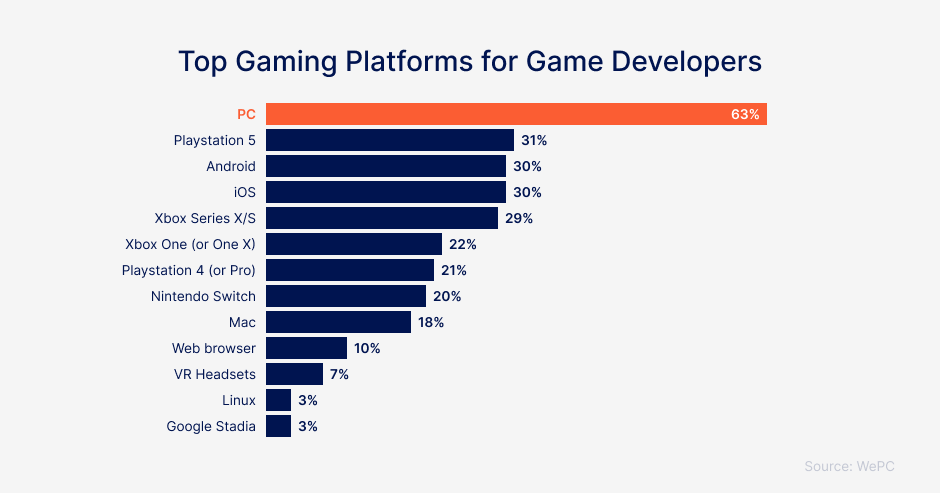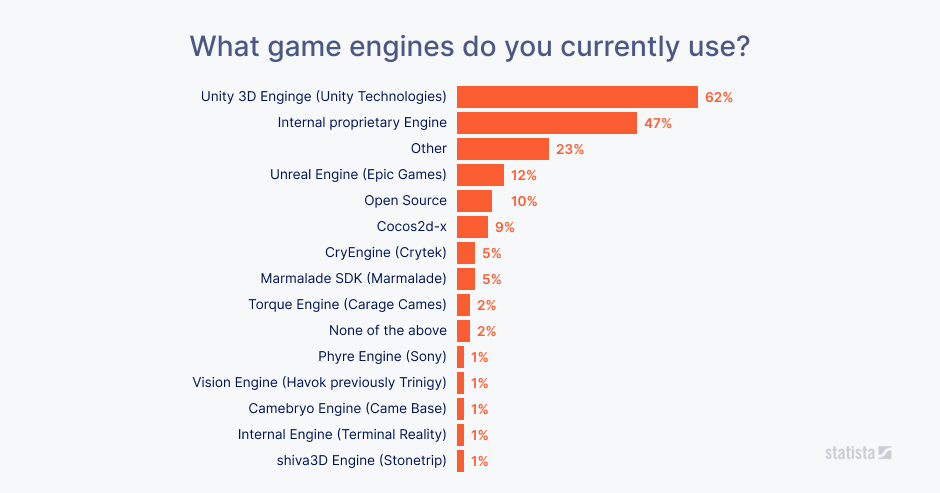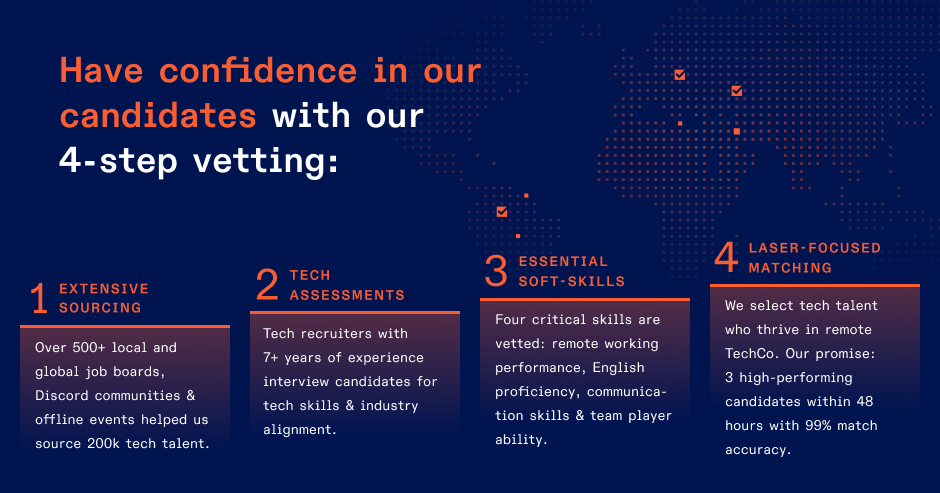The gaming industry, valued at $257 billion, is thriving. With 3 billion gamers worldwide, competition among gaming platforms is intense, benefiting both gamers and the industry.

Discover essential insights for assembling a successful remote video game development team.
Looking to expand your video game development team? We've successfully placed 300+ remote developers globally. 95% passed the trial and stayed over 13 months. Get matched with a vetted remote engineering talent in under 48 hours, ready to start at rates from $1600 per week. Sign up or book a tech consultant now →
The Basics: Game Development Stages
1. Planning
The planning phase lays the groundwork for your game. Key considerations include:
- Budget: Estimate your development budget for planning features and potential profit.
- Platform: Choose between console, iOS, Android, PC, or cross-platform.
- Genre: Decide on game type, like RPG, puzzle, simulation, etc., based on budget and team size.
- Gameplay: Define player interactions, mechanics, storylines, and characters.
- Monetization: Determine revenue strategy, whether through sales, in-app purchases, or ads.
2. Pre-Production
During the pre-production phase, the foundation of the game is laid. This phase focuses on conceptualization and planning, encompassing essential elements:
- High Concept: A concise description capturing the core idea of the game.
- Pitch: A marketing pitch highlighting the game's unique appeal and profit potential.
- Concept Documentation: Detailed plan covering genre, gameplay, story, audience, and schedule.
- Game Design Document (GDD): Blueprint detailing gameplay, design, and concept art.
- Paper Prototyping: Describing features and gameplay ideas using written prototypes.
Pre-production duration varies based on project complexity, typically taking up to 20% of total production time. The team consists of a producer, programmer(s), and a concept artist, occasionally a one-person operation.
Key Roles:
- Concept Artists: Establishing the project's visual tone through early artwork.
- Developers: Focusing on game mechanics and technical aspects.
- Video Game Producers: Overseeing budget and marketing strategies.
- Project Leads: Mediating between teams, making final decisions.
- Writers: Shaping the game's narrative, characters, and world.

3. Production
Production marks the peak of game development, where the game's elements come to life. This phase involves:
- Game Design: Crafting the game's visual, narrative, and technical aspects for an engaging experience.
- Programming: Implementing and testing the game's code using languages like C++, C#, Java, or Python.
- Level Design: Developing game levels that align with the overall game progression.
- Game Art Design: Creating visuals with 2D/3D art tools like Blender 3D, Adobe Photoshop, or Autodesk Maya.
- Audio Production: Creating sound effects, music, and voice-overs to enhance the game.
This phase is the longest and most active, requiring meticulous adherence to the Game Design Document. Specialized team members handle various tasks, such as game designers working on mechanics, level designers creating challenges, and artists using specific software to develop visuals. Additionally, sound engineers craft all audio elements.
Key Production Checkpoints:
- Prototype: Initial test of the game's viability.
- First Playable: Game's look and initial gameplay.
- Vertical Slice: A sample of the core elements.
- Pre-Alpha: Development of most game content.
- Alpha: Game reaches a "feature complete" state.
- Beta: Focuses on optimizing the game.
- Gold Master: Final version ready for launch after extensive testing and refinement.
4. Testing
Testing is a crucial phase in game development, where specialized testers ensure the game's quality. They conduct repetitive tasks to identify errors, glitches, or issues in the game. Testing includes:
- Solid Environments: Checking if players can interact properly with the game environment without encountering issues like walking through walls.
- Performance: Ensuring the game runs smoothly without visual glitches or framerate drops.
- Exploits: Preventing players from taking advantage of game mechanics unfairly.
- Softlocks: Ensuring players don't get stuck unintentionally.
- Difficulty: Analyzing the game's challenge level for balanced gameplay.
- Scripting and Dialogue: Reviewing dialogues for spelling and voice acting quality.
Testing occurs across all game development stages, with testers mainly active during the production phase. Stress tests push the game's limits to uncover potential issues, while comprehensive testing during Beta ensures the game is stable and playable before its release.
5. Post-Production
After a video game is launched, it enters the 'post-production' or maintenance stage. During this phase, the gaming studio ensures the game's stability and performance remain high. Players play a vital role by reporting any issues they encounter, which helps the studio identify and fix problems through regular updates called 'patches.'
Game programmers are crucial in creating stable patches by making changes to the game's code to fix bugs. Studios release updates to meet various platform requirements, adapting the game to platform changes.
Besides fixing bugs, gaming companies often enhance the gaming experience by adding new content and mechanics, keeping players engaged.
Continuous maintenance, regular testing, and responsiveness to player feedback are essential in this stage to maintain the game's quality and popularity in the dynamic gaming industry.
Check out: Inside the World of Game Development: 5 Stages of Video Game Creation
Identifying the Right Talent for Your Remote Team
Finding the perfect candidates for your remote video game development team is crucial to ensure success. By leveraging Index's 4-step vetting process, tapping into a global talent pool, hiring contractors with specialized skills, and speeding up the hiring process, you can build a winning remote team for your game development projects.

Utilizing Index.dev's 4-Step Vetting Process
Index offers a rigorous 4-step vetting process to select top-notch tech talents. This process includes extensive sourcing, thorough tech assessment, meticulous soft skill verification, and laser-focused, super-accurate matching. By evaluating candidates based on performance-driven mindset, remote work skills, advanced English proficiency, and US-level work ethics, Index ensures you find the best fit for your remote team.
Accessing a Global Talent Pool
By partnering with Index.dev, you gain access to a vast and diverse pool of talent from tech hubs around the world. This allows your company to benefit from a rich diversity of perspectives, skills, and market insights, significantly enhancing your game development projects.
Hiring Contractors for Specialized Skills and Niche Technologies
Contractors offer valuable expertise in niche technologies and domains, which can be a game-changer for your company. By hiring contractors through Index.dev, you can quickly access specialized skills and resources, giving your company a competitive edge while maintaining flexibility in cost management.
Speeding Up the Hiring Process with Experienced Tech Remote-Work Platforms
Working with experienced tech remote-work platforms like Index.dev can significantly expedite your hiring process. With their expertise in identifying top talent quickly, you save time and effort, ensuring your remote team is up and running in no time.
Also read: 15 less-known benefits of hiring contractors globally with Index.dev
Setting Up a Collaborative Remote Work Environment
To ensure the success of your remote video game development team, creating a collaborative remote work environment is crucial. By facilitating clear communication, managing projects virtually, fostering trust and camaraderie among team members, and establishing a strong onboarding process for new hires, you can set the stage for a thriving remote team.
Facilitating Clear Communication with Tools
Effective communication is the backbone of any remote team. Utilizing tools like Slack, Zoom, and Google Meet can help your team stay connected and collaborate efficiently. These platforms enable real-time communication, file sharing, and video conferencing, ensuring that everyone is on the same page.
Managing Projects Virtually for Seamless Collaboration
Project management tools like Jira or Trello can play a pivotal role in keeping your remote team organized and on track. These tools allow you to create, assign, and monitor tasks, ensuring that everyone is aware of their responsibilities and deadlines. In addition, they provide a centralized platform for tracking progress and sharing project updates, fostering transparency and accountability within your remote team.
Fostering Trust and Camaraderie Among Team Members
Building trust and camaraderie among remote team members is essential to maintain a positive and collaborative work environment. Organizing regular team-building activities, such as virtual happy hours or online games, can help foster a sense of connection and trust among your team members, ultimately boosting morale and productivity.
Establishing a Strong Onboarding Process for New Hires
A well-designed onboarding process is crucial for setting new hires up for success in your remote team. Creating detailed documentation and providing mentorship can help new employees quickly adapt to the remote work environment and better understand their roles and responsibilities. This strong foundation will enable them to integrate seamlessly into your remote team and contribute effectively to your game development projects.
Also read: 18 indispensable productivity tools for remote & distributed development teams
Promoting a Strong Company Culture in Your Remote Team
A strong company culture is vital to the success of your remote video game development team. By creating a virtual watercooler space, ensuring access to necessary tools and equipment, conducting regular performance evaluations, encouraging work-life balance, and providing opportunities for continuous learning and professional development, you can foster a positive and supportive remote work environment.
Creating a Virtual Watercooler Space
Having a dedicated space for team members to socialize and engage in non-work-related conversations can significantly contribute to a healthy company culture. This virtual watercooler space enables team members to build connections, share experiences, and unwind, ultimately leading to a more cohesive and satisfied remote team.
Ensuring Access to Necessary Tools and Equipment
Providing your remote team members with the necessary software licenses, hardware, and comfortable workspaces is crucial for their productivity and satisfaction. By ensuring that your team has access to the tools they need to perform their tasks effectively, you demonstrate your commitment to their success and well-being.
Conducting Regular Performance Evaluations
Performance reviews and one-on-one meetings play a significant role in maintaining a strong company culture within your remote team. These sessions provide opportunities to address any concerns, offer guidance for improvement, and celebrate successes. Regular evaluations and feedback help your team members feel valued and supported, fostering a positive work environment.
Encouraging Work-Life Balance and Setting Clear Boundaries
Promoting a healthy work-life balance is essential for the well-being and productivity of your remote team. Encouraging team members to set clear boundaries between their work and personal lives, take breaks, and prioritize self-care can contribute to a more balanced and satisfied remote workforce.
Providing Opportunities for Professional Development
Investing in your remote team's continuous learning and professional development not only enhances their skills and expertise but also demonstrates your commitment to their growth. By providing access to online courses, workshops, or conferences, you empower your team members to excel in their roles and contribute to the overall success of your video game development projects.
Also read: Index.dev’s Winning Formula for Building High-Performing Tech Teams
Adapting to Challenges and Embracing Flexibility
In the dynamic world of video game development, it is crucial to adapt to challenges and embrace flexibility within your remote team. By expecting delays, planning for flexibility, scaling your infrastructure, and enhancing builds and workflows, you can effectively manage your remote team and ensure the success of your game development projects.
Expecting Delays and Planning for Flexibility
Remote game development may come with unforeseen challenges and delays. It is essential to account for these potential obstacles when planning your projects. By being prepared for possible delays and having a flexible approach, you can make necessary adjustments, ensuring your remote team remains focused and productive.
Scaling Infrastructure for a Distributed Team
As your remote team grows, it is crucial to scale your infrastructure accordingly. Moving to the cloud or setting up a federated architecture can help accommodate the needs of a distributed team. These solutions offer seamless collaboration, enhanced security, and the ability to scale resources as required, ultimately supporting the smooth operation of your remote game development team.
Enhancing Builds and Optimizing Workflows
Efficient builds and optimized workflows are vital for the productivity of your remote team. Supporting build farms and speeding up builds can help streamline the development process. In addition, utilizing tools like Perforce Streams can further optimize workflows, ensuring your remote team stays on track and focused on delivering high-quality game projects.
Also read: 6 crucial strategies for managing remote development teams
Unlock Your Remote Team's Potential
Throughout this guide, we've explored the key aspects of building a winning remote team for video game development, from identifying the right talent and setting up a collaborative work environment to promoting a strong company culture and embracing flexibility. By leveraging the benefits of Index, you can access a global talent pool, enjoy increased flexibility in team scaling, and simplify payroll and compliance processes.
Ready to scale your remote software team and streamline your hiring and management processes? Visit www.index.dev today!